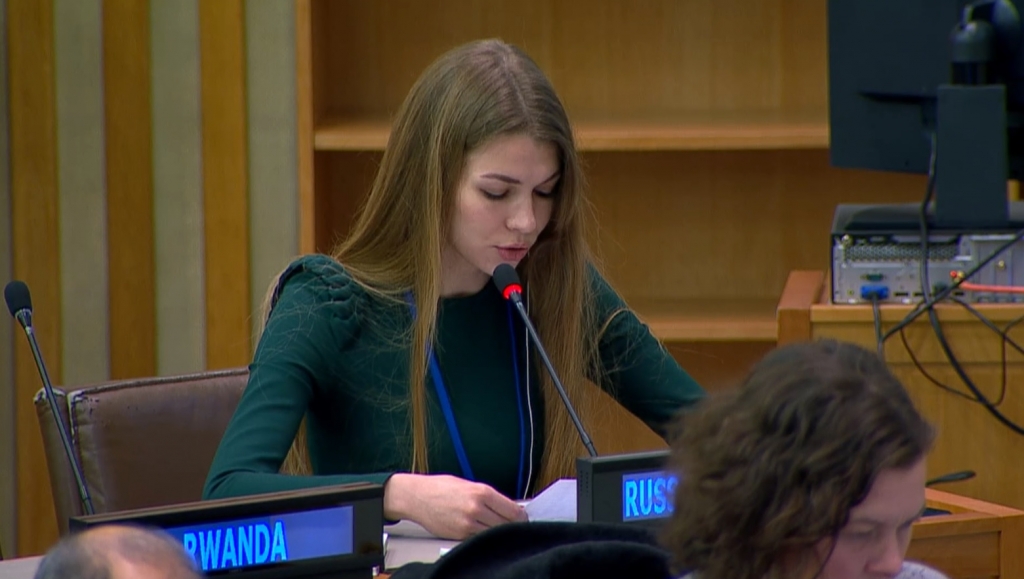Statement by Representative of the Russian Federation Ms.Irina Tyazhlova at the Sixth session of the UN Open-Ended Working Group on security of and in the use of ICTs 2021-2025
Mr. Chair,
Amid growing geopolitical tensions, the risk of interstate conflicts stemming from the use of information and communications technologies (ICTs) for purposes contrary to the UN Charter is coming to the fore in the ICT field. This is mainly due to the possibility of disproportionate use of measures of response to threats. Taking into account the anonymity in information space, “false flag” computer attacks aimed at holding other States responsible also pose a serious danger. In the absence of a universal methodology for identifying perpetrators, criteria for classifying computer attacks as armed attacks, and principles for studying computer incidents, making any political decisions in the use of ICTs may bear additional risks to international peace and security.
We believe that the global community needs to conduct an in-depth discussion and analysis of a set of factors contributing to the escalation of threats, as well as measures to counter these threats. As a basis for such a discussion, we propose to consider the following list of threats to information security and related factors from the concept of the UN Convention on International Information Security, submitted by Belarus, the DPRK, Nicaragua, the Russian Federation, Syria and Venezuela as an official document of the UNGA 77h session:
1. Use of ICTs by States in the military-political and other spheres in order to undermine or infringe upon the sovereignty, violate the territorial integrity, social and economic stability of sovereign States, interfere in their internal affairs, as well as to commit other acts in the global information space impeding the maintenance of international peace and security;
2. Computer attacks on the information resources of States, including critical information infrastructure;
3. Monopolization of the ICT-market by individual States and/or, with their assistance, by private companies through restricting access to advanced ICTs by other States and increasing their technological dependence on States dominating in the field of informatization as well as increasing the digital divide;
4. Unsubstantiated accusations brought by some States against other States of organizing and carrying out wrongful acts with the use of ICTs, including computer attacks;
5. Use of information resources under the jurisdiction of another State without the approval of the competent bodies of that State;
6. Placement of free-to-access tools for computer attacks, instructions on methods of their organization, coordination and development of practical skills to use such tools, in information space of States;
7. Use of ICTs to the detriment of fundamental human rights and freedoms in information space, primarily, the right to respect for private life;
8. Integration of undeclared capabilities in ICTs, as well as concealment by manufacturers of information on vulnerabilities in their products;
9. Use by States of their own information infrastructure to commit internationally wrongful acts, as well as use of proxies, including non‑State actors, to commit such acts;
10. Dissemination of information through ICTs that is detrimental to the socio-political and socio-economic foundations, spiritual, moral and cultural environment of States and is threatening the lives and safety of citizens;
11. Challenges in identifying exactly the source of computer attacks caused by the technological specificities of ICTs and the absence of institutional mechanisms to ensure de-anonymization of information space.
To counter these threats, it is necessary to work towards the creation of a global information security system under the UN auspices in accordance with the provisions of the UNGA resolution No.77/36 and the draft UNGA resolution on international information security A/C.1/78/L.11 adopted on November 2 in the First Committee of the UNGA 78th session. Such a system should be based on compliance with the principles of prevention and peaceful settlement of interstate disputes, sovereign equality of States and indivisible security. For its effective functioning, it is necessary to develop an appropriate international legal regime.
Special attention should be given to the protection of personal and other data. In our view, it is reasonable to identify and approve principles for obtaining, storing and processing personal data equal for all UN Member States. This step will significantly increase the level of protection of personal data in the relevant cross-border exchange, as well as contribute to the development of national legislation on personal data protection.
Thank you for attention.
